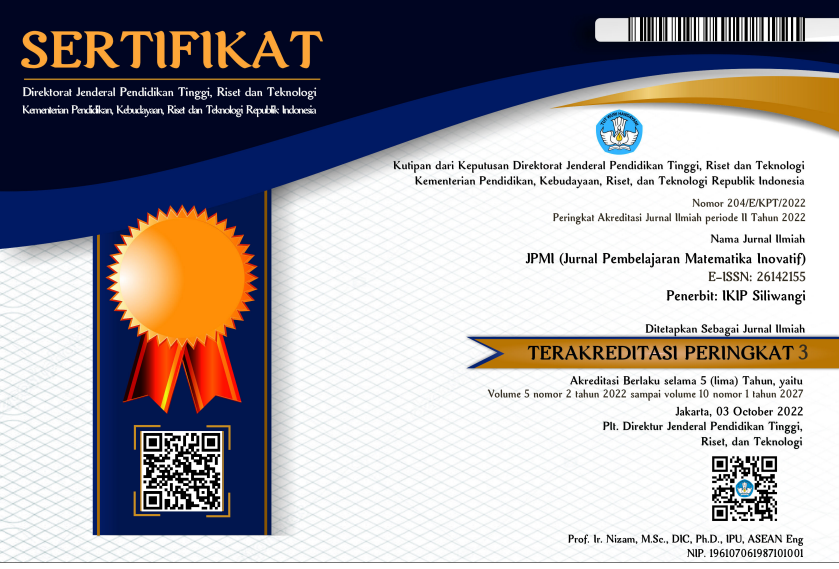ANALISIS METACOGNITIVE BLINDNESS SISWA DALAM MENYELESAIKAN MASALAH BERBASIS HIGHER ORDER THINKING SKILL
DOI:
https://doi.org/10.22460/jpmi.v6i3.17572Keywords:
Metacognitive Blindness, Problem-Solving, Higher Order Thinking SkillAbstract
This study aims to trace the process of occurrence of metacognitive blindness in students in solving HOTS-based problems. This type of research uses qualitative methods. Data collection techniques used test instruments in the form of HOTS-based problem-solving questions and interviews. The sampling technique in this study uses Purposefully selection, where the researcher chooses deliberately and fully planning the participants to be studied. The results showed that both subjects experienced metacognitive failure caused by a presence flag during the problem-solving process. S1 experienced metacognitive blindness namely 1) errors in understanding what is meant by the problem, 2) being unable to connect one understanding with another understanding, 3) maintaining an inappropriate strategy, and 4) ignoring correct calculations when planning solutions and implementing plans. Furthermore, Subject S2 experienced metacognitive blindness namely 1) students maintain inappropriate mathematical problem-solving strategies, 2) are unable to relate one understanding to another, and 3) maintain inappropriate strategies.
References
Barrera-Mora, F., & Reyes-RodrÃguez, A. (2013). Cognitive processes developed by students when solving mathematical problems within technological environments. Mathematics Enthusiast, 10(1–2), 109–136. https://doi.org/10.54870/1551-3440.1262
Creswell, J. W. (2010). Research design pendekatan kualitatif, kuantitatif, dan mixed. In Yogyakarta: pustaka pelajar.
Foshay, R., & Kirkley, J. (2003). Principles for Teaching Problem Solving. Technical Paper, January 1998, 1–16.
Goos, M. (2002). Title : Author : Affiliation : Address : understanding metacognitive failure merrilyn goos school of education , The University of Queensland School of Education The University of Queensland St Lucia Qld 4072 Australia Telephone : Fax : Email : Running He. Journal of Mathematical Behavior, 21(3), 1–35.
Huda, N., Sutawidjaja, A., Subanji, S., & Rahardjo, S. (2018). The errors of metacognitive evaluation on metacognitive failure of students in mathematical problem solving. Journal of Physics: Conference Series, 1008(1). https://doi.org/10.1088/1742-6596/1008/1/012073
Huda, N., Sutawidjaja, A., Subanji, S., & Rahardjo, S. (2019). Investigation of students’ metacognitive failures in mathematical problem solving based on metacognitive behavior. Journal of Physics: Conference Series, 1157(3). https://doi.org/10.1088/1742-6596/1157/3/032102
Magiera, M. T., & Zawojewski, J. S. (2011). Characterizations of social-based and self-based contexts associated with students’awareness, evaluation,and regulation of their thinking during small-group mathematical modeling. Journal for Research in Mathematics Education, 42(5), 486–520. https://doi.org/10.5951/jresematheduc.42.5.0486
Mahromah, L. A., & Manoy, J. T. (2018). Identifikasi tingkat metakognisi siswa dalam. Jurnal Jurusan Matematika Unesa, 3(2), 1–8.
Polya. (1973). How to Solve It. 1–284.
Rijali, A. (2019). Analisis Data Kualitatif. Alhadharah: Jurnal Ilmu Dakwah, 17(33), 81. https://doi.org/10.18592/alhadharah.v17i33.2374
Schoenfeld, A. H. (2016). Mathematical thinking and problem solving. Mathematical Thinking and Problem Solving, January 1989. https://doi.org/10.4324/9781315044613
Setyadi, D. (2018). Proses metakognisi mahasiswa dalam memecahkan masalah matematika (studi kasus pada mahasiswa pendidikan matematika UKSW). Kreano, Jurnal Matematika Kreatif-Inovatif, 9(1), 93–99.
Sutini, S. (2019). Kemampuan metakognitif dan komunikasi matematis dalam pemecahan masalah matematika. Jurnal Review Pembelajaran Matematika, 4(1), 32–47. https://doi.org/10.15642/jrpm.2019.4.1.32-47
Tampi, W. (2016). Proses berpikir siswa dalam pemecahan masalah berdasarkan counting on. ETHOS (Jurnal Penelitian Dan Pengabdian), 2013, 21. https://doi.org/10.29313/ethos.v0i0.1669
Wilson, J., & Clarke, D. (2004). Towards the modelling of mathematical metacognition. Mathematics Education Research Journal, 16(2), 25–48. https://doi.org/10.1007/BF03217394

















